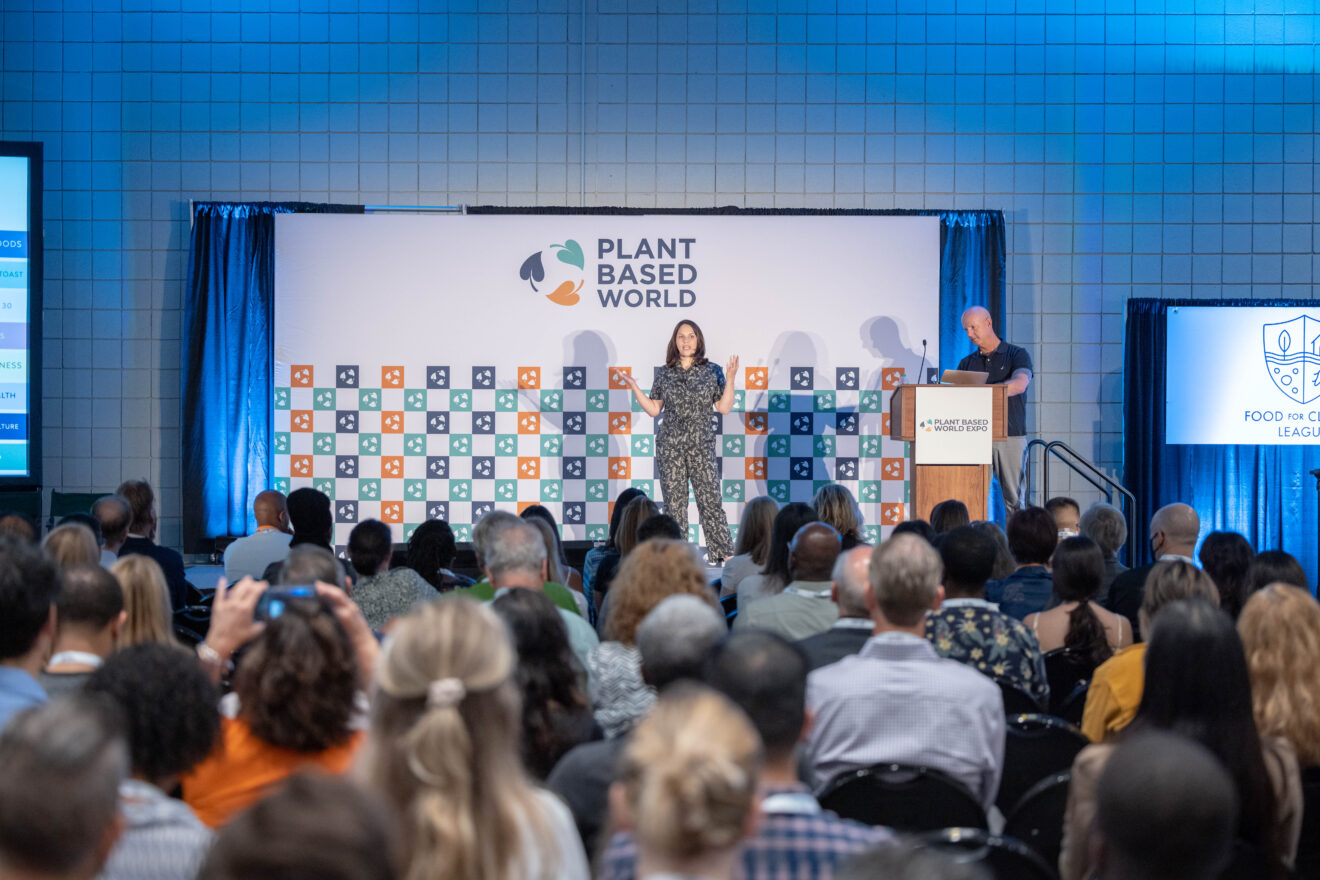Sign up for Restaurant SmartBrief today, free.
Once upon a time, food was merely sustenance, fuel we needed to gain the energy to do our work, live our lives and care for the people in our communities.
Over generations, food came to play a bigger role, with traditional holiday and celebratory meals shared with family and friends.
Then came digital technology. As smartphones and social media dramatically changed the way we communicate and connect, they also expanded the part food plays in peoples’ lives, Eve Turow-Paul, author of Hungry: Avocado Toast, Instagram Influencers and Our Search for Connection and Meaning, said during her keynote at the Plant Based World Expo in New York City last week.
“Technology has changed the human experience,” Turow-Paul said.
Turow-Paul collaborated with research firm Datassential to produce The Hungry Study, a survey of 1,100 consumers across demographic groups.
The lion’s share of younger consumers surveyed – 85% of millennials and 84% of Gen Z-ers – said they’re “passionate about food,” Turow-Paul said.
That passion shows in other data, including the most recent Piper Sanders teens’ spending survey in which respondents ranked food as their top spending category.
Taking control with food
For these “tech-tethered” consumers, food plays a key role in their efforts to gain control of a world that often seems scary and unsafe. Access to round-the-clock news and information can make the world seem much more dangerous and chaotic than it really is. On top of that, in recent years, the pandemic and other events including the rise of the Black Lives Matter movement and the climate crisis have added to the sense of unease.
Not surprisingly, the most tech-tethered demographic groups are also the ones reporting the highest levels of anxiety – 41.5% of Gen Z and millennials report having anxiety or depressive disorders. The effort to feel more in control is “showing up in how people eat,” Turow-Paul said.
That craving for control also led to learning more about food, nutrition and health, which naturally drove many to explore plant-based eating, an umbrella that can include everyone from vegans to flexitarians and omnivores who are putting more fruits and vegetables on their plates.
Many of these young consumers are more likely to share pictures of their meals than to share actual meals with other people on a regular basis, even as they report a craving for community, love and belonging. Instagram-worthy meals can be a way of seeking social approval and what we eat can be “a sign of our values, identity and how we want to be seen,” Turow-Pau said.
The wide range of sub communities in the plant-based movement also means people can feel a part of it even if they’re tailoring the meaning of plant-based to fit their lifestyles and preferences.
Building skills like making sourdough and learning to garden have also become part of many consumers’ efforts to gain more control as well as to find more purpose and meaning in their lives. Connecting to nature through efforts like cultivating urban gardens and foraging are also part of the quest for meaning, as is altruism.
Doing good with food choices
The movement toward more plant-based eating can play a key role in efforts to become more altruistic, especially in the focus on equitable access to food, sustainability and working to solve the climate crisis.
Plant-rich diets and cutting food waste are in the top three solutions for fixing the climate crises, Turow-Paul said.
The focus on altruism and making healthy plant foods more accessible to all was also a theme in a separate talk at the Expo by celebrity chef and restaurateur Spike Mendelsohn.
“Our system treats food like a privilege and it needs to be a human right,” Mendelsohn said during his keynote address.

Mendelsohn grew up in the restaurant industry with parents who were passionate about both food and giving back to the community. His early experiences and his innate curiosity led to world travels and culinary training that ultimately led him to embrace plant-based food.
After settling in Washington, D.C., and opening the fast-casual concept Good Stuff Eatery, Mendelsohn began interacting with customers who were involved in policy making and took an interest in finding ways to influence food policy.
He started learning about food advocacy and became part of First Lady Michelle Obama’s Let’s Move campaign. He was already learning more about the importance of plants when he met investor and activist Seth Goldman, who slipped a cooler bag with Beyond Burgers in under the chef’s chair during an event.
Mendelsohn cooked the burgers for his wife, who is vegan, and was so impressed that he started partnering with Beyond Meat to share recipes and promote new products.
And the meeting ultimately led to a partnership with Goldman that resulted in the creation of PLNT Burger, which now has locations in 10 Whole Foods Market stores in addition to its two standalone units selling plant-based versions of popular fast food including burgers, fries and shakes.
The pair also created plant-based CPG company Eat the Change.
Trends come together to fuel plant-based change
In his speech, Mendelsohn talked about the way plant-based eating plays into three mega trends: the rise of snacking and comfort foods; plant-based foods hitting the mainstream; and the rise in eco-anxiety and fears about climate change.
A stroll around the expo floor highlighted the growing volume of new plant-based options designed to appeal to a wide range of consumers from vegans to regular meat eaters, and consumers encounter a growing array of plant-based burgers, nuggets and other alternatives to their favorite foods at their regular supermarkets.
Eco-anxiety and the potential to use food as a solution can also drive more people to explore plant-based eating.
“Climate change is real but it’s not always easy to wrap your head around it,” Mendelsohn said. “If you look at it through the lens of food, the choices you make every day can have a drastic impact on people and the planet.”
PLNT Burger caters to all three of the trends, with a menu of traditional fast food favorites made from plants that’s designed to appeal to flexitarians, while also aiming to play a role in reinventing the food system to become more sustainable and making healthier foods more affordable and accessible for everyone.
“Chefs can enable the transition to plant-based to be an upgrade, not a sacrifice,” Mendelsohn said.
That culinary focus is part of new product creation at Eat the Change as well, where innovators are eschewing six major crops – sugar, corn, rice, wheat, potatoes and soy – and exploring the possibilities of many of the other 595,000 plants on the planet.
Mushroom-based jerky snacks were first, followed by chews made from carrots.
Chefs understand food and peoples’ eating habits, making them an essential part of the transition to plant-based and meeting consumers where they are, Mendelsohn said.
“It’s important for chefs to be at the forefront.”
Related stories:
- Plant-based foods that emphasize plants appeal to consumers seeking less-processed foods
- How inflation is affecting decisions in the produce aisle
- Trends in modern approaches to eating: Plant-focused vs. plant-based
________________________________________________
If you liked this article, sign up for SmartBrief’s free email newsletter from the National Restaurant Association. It’s among SmartBrief’s more than 250 industry-focused newsletters.
